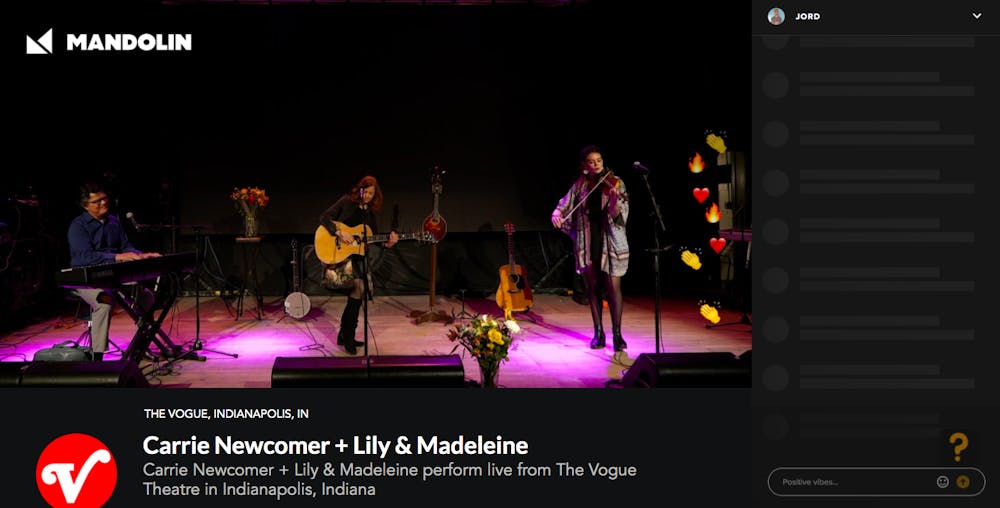The COVID-19 pandemic is a time when people need music the most, yet the pandemic is the thing that keeps music from bringing people together, said Carrie Newcomer Southern Indiana singer-songwriter.
In March when businesses shut down because of the COVID-19 pandemic, performance spaces were some of the first to close their doors. As a result, many musicians and other performers, including Newcomer, lost their main stream of revenue.
Newcomer was scheduled to perform at about 100 venues in 2020, with locations stretching from Maine to Oregon, before almost her entire year was canceled because of the COVID-19 pandemic. Some of Newcomer’s performances were rescheduled to February 2021, but she said she expects many of them will be canceled.
“Into the summer it became clear that it was going to be a while until people felt comfortable gathering in small spaces or even halls for concerts,” she said.
Newcomer said she has lost about half of her annual income because of the cancellations and expects to lose even more because of possible future cancellations.
Bloomington musician and artist Sam Bartlett, who is typically on the road for 120 days a year, said he was on tour in Olympia, Washington, in February when he heard about the COVID-19 outbreak in Seattle.
“I was heading toward the busiest schedule I had almost ever had in my life,” Bartlett said. “As March hit, the cancellations started coming in, and it was basically like my calendar had been hacked.”
Bartlett said since his international tour was canceled, he started teaching more private music lessons, illustrated a Zoom instructional video for health care workers, completed many commissioned plywood sculptures, applied for and received a thousand-dollar grant and done a few online shows where he teaches people parlor tricks.
He also recently performed with the band Brad Leftwich and the Humdingers at the Lotus Festival, where they were paid less than if the performance was in person.
“It was a gig, you know, it wasn’t nothing,” Bartlett said. “I think now that’s what’s happened, is that you just take any gig even if it doesn’t seem like it’s going to pay very well.”
Doing this work has made up about 75% of the money Bartlett lost, he said.
Newcomer said she attempted to recover some of her financial losses by doing virtual concerts in a streaming studio she built. The studio, which she started building in March, includes corrections for sound and technology that help her do high-quality online performances from her home.
She said while virtual concerts do not include the same audience interaction and ambiance as in-person shows, if using certain streaming platforms, virtual performances can have the live element that makes the audience feel connected to the performance and include partial audience interaction through emojis, likes and comments.
The music live streaming service Newcomer consistently uses for her performances is Mandolin, which was co-founded by her husband Robert Meitus, who is an attorney for artists and used to perform himself.
Meitus said he wanted to create the service because of limitations of other similar products.
Some of Mandolin’s features include quality streaming and sound quality, audience interaction in the form of emojis, the ability to charge money to watch and the fact that the video does not archive, so those watching the performance have to watch live. Meitus said the live aspect was important because it brings out the best and edgiest performances.
“You just get what you get,” Meitus said. “That could be good and that could be bad, but usually it’s good.”
Another new feature that will be added to the program at the end of the month is watch parties, where people can check in to the service early and see friends in a Zoom-like setting before the performance starts. Then, during the concert, they can have a group chat in the app that allows them to talk separately from the overall concert chat. This experience is supposed to mimic going out to eat before a concert and watching it with a group, Meitus said.
He said he believes people will stream concerts in venues even after the effects of the COVID-19 pandemic fade because it will allow venues and artists to make more money by selling virtual concert tickets in addition to in-person ones.
“Whatever number of tickets you sell helps the artists, helps the venue and the managers and the agents,” Meitus said. “Everybody wins.”
Still, even with advancements that provide music during the pandemic and show promise for future music experiences, there are still artists struggling to make ends meet, Bartlett said. He said artists and performers may need to stop pursuing art full time during the coronavirus pandemic and eventually return to their crafts.
“I think people who are depending upon it are so screwed,” Bartlett said. “Keep working on your art at home and wait it out when the gigs come back, because they’ll be back.”
He said he is confident art will come back because people need art.
“Art really does lift people up,” Bartlett said. “It really helps people out when things are sort of bleak and scary-looking.”




